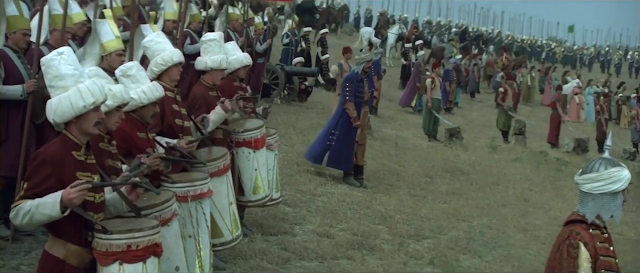 |
| Who would win: the mightiest superpower of the pre-modern world, or some Hammer horror extras led by the edgiest boi you know? The answer might surprise you. |
Vlad III of Wallachia may be the single most mischaracterised figure in history. Everyone has heard of Bram Stoker's excellent but obviously ahistorical Dracula, which portrayed the auspicious Voivode as a becaped vampire, but few realise that horror fiction about him started in his own lifetime, during his twelve-year imprisonment courtesy of his erstwhile ally, Matthias Corvinus of Hungary. The real Vlad was one of the first victims of the ugliest evil in history: mass media. The burgeoning success of the newly minted printing press allowed for the mass production and dissemination of slanderous texts depicting Vlad as a cartoonishly cruel monster who did things like impale pregnant women on spikes, when in reality he impaled violent criminal psychopaths and bloodthirsty, rapacious Ottoman invaders.
 |
| In a particularly kino moment, Mehmet's troops advance through this array of skeletal remains to find a vacant stake left waiting for him. |
In learning this, your bias will still prompt you to fall back on "but, but, but impaling aaanyone is wrong!" but this ignores the obvious point that in the 15th Century, everyone everywhere used torture and execution of one sort or another, and that Vlad learned his signature moves from the Ottoman Turks themselves during the period in his life in which he served as a janissary in their army because the Ottoman Empire liked to take children in tribute from the peoples it invaded and oppressed. Because in point of fact, the Ottoman Empire was cartoonishly, monstrously evil, but you have never once seen it depicted as such, or learned anything about it at all, because western """"education"""" curricula aren't fit for purpose. In a just world, Vlad would be celebrated as the hero he was, and Mehmet the Conquerer, whom he pushed back against impossible odds, would be reviled the villain.
 |
| Yes, this is the same asshole who conquered Constantinople. However, the movie actually massively scaled down the ridiculous ostentatiousness of his turban by about half its size. |
"But Pat", you groan oafishly, migraine overtaking you at the prospect of learning any real history, "how should I know such things? Read a whole book? I am an idiot and can't possibly stretch to such a feat". Fear not, dumbass! For there exists a top-10-worthy kinographeme on precisely this subject to both entertain and enlighten you. 1979's Vlad Țepeș, also released in shorter form in the Anglosphere as Vlad the Impaler: The True Life of Dracula, is both the most intelligent historical film ever made, and yet the most exciting, accessible work of entertainment you could ever ask for. You won't need to know thing one about Romania or 15th Century geopolitics to understand this kino, which is far more accurately researched than anything made by H*llywood. Ștefan Sileanu and his moustache excel in the titular role, for this is a Romanian production, set in the authentic vistas of that fabled land.
It's revealing that this movie based in real history manages to juggle realpolitikal intrigue with rousing battle setpieces better than any made-up fantasy capeshit like Star Wars, Game of Thrones or Gladiator, all of which had far more leeway since their respective writers could make up any scenario they chose. Vlad's effort to unite his people in defence of their homeland is frought with the threat of corrupt, treacherous boyars, who will do anything to prevent Vlad from cleaning house and bringing their gravy train to an end, even if it means selling out to the Ottoman behemoth at their border. The conclusion is bittersweet, as Vlad achieves his goals at the cost of inevitable betrayal and ignominy, but the movie grants him the dignity of self-awareness in the knowledge of the terrible cost his victory incurs.



No comments:
Post a Comment